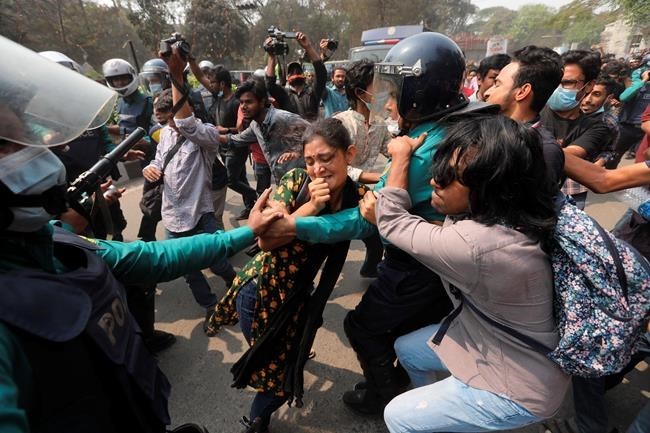
Bangladeshi students clash with police during a protest in Dhaka, Bangladesh, Monday, March 1, 2021. About 300 student activists rallied in Bangladesh’s capital on Monday to denounce the death in prison of Mushtaq Ahmed, a writer and commentator who was arrested last year on charges of violating a sweeping digital security law that critics say chokes freedom of expression. (AP Photo/Mahmud Hossain Opu)
Republished March 01, 2021 - 8:52 AM
Original Publication Date March 01, 2021 - 12:26 AM
DHAKA, Bangladesh - About 300 student activists rallied in Bangladesh’s capital on Monday to denounce the death in prison of a writer and commentator who was arrested last year on charges of violating a sweeping digital security law that critics say chokes freedom of expression.
The protesters marched through the Dhaka University campus and Dhaka's streets toward the country’s Home Ministry to also demand the annulment of the digital security law and the release of seven student activists arrested during recent protests denouncing the death of 53-year-old Mushtaq Ahmed.
They broke a barricade by removing barbed wire fences on the way to the ministry, but were intercepted by a few hundred police officers outside the ministry in downtown Dhaka.
“The state must take responsibility. He has been killed, it was not a natural death. How come he was held for nine months in jail without any justice?” said one protester, Mahfuza Akhter.
“We want justice,” she said.
The protests ended peacefully.
Ahmed's death Thursday night sparked protests on streets and on social media, and prompted global human rights groups, including Human Rights Watch and Amnesty International, to urge Bangladesh's government to conduct a thorough investigation. The New York-based Committee to Protect Journalists, or CPJ, demanded that the government cancel the security act.
On Monday, the U.N. High Commissioner for Human Rights Michelle Bachelet urged the government of Bangladesh in a Geneva-datelined statement to ensure that an investigation into Ahmed's death is “prompt, transparent and independent.”
Ahmed was arrested in Dhaka in May last year for making comments on social media that criticized the government’s handling of the coronavirus pandemic. He was denied bail at least six times. At least 10 other people were charged with sedition under the digital security law in the same case Ahmed faced.
The CPJ has demanded the release from prison of political cartoonist Kabir Kishore, who was arrested in the case last year. Kishore’s lawyers said during previous court proceedings that he was “mercilessly tortured” in custody.
While a postmortem report said Ahmed died naturally, the protesters and his lawyers said that he was tortured, and that despite being in poor health was held in prison for nine months and denied bail.
On Monday, the protesters used a loudspeaker to chant slogans that blamed Prime Minister Sheikh Hasina for Ahmed's death.
Police have said Ahmed attempted to tarnish the image of the nation and spread confusion.
The 2018 Digital Security Act includes a jail sentence of up to 14 years for any propaganda or campaign against the country’s independence war, its founding father Sheikh Mujibur Rahman, the national anthem or flag. It also says a person can be jailed for up to 10 years for destroying communal harmony or creating unrest or disorder.
The broad characterization of charges led Amnesty International to conclude that the law “is plagued by a lack of clear definitions, explanations and exceptions, including repressive non-bailable penalties for at least 14 offences.”
Hasina says the law is necessary to maintain order. Opposition parties and editors have warned that the scope of the law can be misused against critics, and the CPJ said it was being used “repeatedly and unjustly against journalists.”
Bachelet said the U.N. bodies have long raised concerns about the “ill-defined, overly broad provisions” of the Digital Security Act.
“Bangladesh urgently needs to suspend the application of the Digital Security Act and conduct a review of its provisions to bring them in line with the requirements of international human rights law," Bachelet said.
News from © The Associated Press, 2021